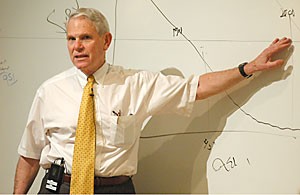Nearly 100 UA medical students, department heads and College of Medicine physicians attended a conference Friday to learn about geriatrics, the study of disease or disability prevention in the elderly, and its importance in all areas of medicine.
Dr. John Burton, director of the Johns Hopkins Geriatric Education Center, spoke for the first half of the hour-long conference about how aging connects with all medical specialties. He emphasized how important it is for doctors to be aware of America’s growing elderly population and the specialized care they need.
“”If you aren’t to some extent a geriatric specialist, you will not be able to give the best care needed to your older patients,”” Burton said. “”They are so deserving and so grateful that I can’t imagine a more rewarding field of medicine.””
Burton is a Mason F. Lord Professor of Medicine at Johns Hopkins and a national leader in geriatric education.
Burton said America has been too focused on the acute care paradigm for the last 50 years.
“”Now we have a wonderful opportunity and challenge in medicine to get this right,”” he said.
“”People aren’t dying of strokes or heart attacks anymore, they are dying of chronic conditions like congestive heart failure.””
People aged 95 and older are the fastest-growing age group in the country, and the number of people ages 90 to 100 will double in the next 20 years, Burton said.
By 2030, the number of adults age 65 and older in the U.S. will nearly double to 70 million, according to the American Geriatrics Society Web site.
“”This is not a bad thing at all,”” Burton said. “”We just need to understand what they need and how to treat them in a comprehensive and compassionate way.””
Academic geriatrics is a fairly new specialty, but medical care for the elderly will dominate the health care system and the economy someday soon, Burton said.
“”Think about your grandma, grandpa or parents when they are in their late 80s and how you would want them to be cared for and apply that to your own practice,”” Burton said.
Dr. Mindy Fain, program director of the Geriatric Medicine Training Program at the College of Medicine, said everything about an older person’s care is different, which is why it is so important to make sure all physicians are knowledgeable about geriatrics.
“”The needs of older people are very important,”” Fain said.
This was the first conference like this hosted by the Arizona Center on Aging, and the high turnout may reflect the topic’s growing relevance.
“”It’s amazing to see an American medical school with this kind of turnout, especially when it’s (the conference) about aging,”” Burton said.
Nick Mckernan, a fourth-year medical student going into anesthesiology, said he has seen an increasing number of conferences that focus on aging.
“”It’s just a reflection of our aging population and an important thing to learn about,”” Mckernan said.
During the second half of the lecture, medical students had the opportunity to talk with department heads about how aging influences their specialties.
“”I don’t think students realize how much aging will impact their careers,”” said Gabe Sarah, a second-year medical student who helped set up the conference. “”For example, in anesthesiology, the amount of anesthetics you would give to a 50-year-old is a lot different than what you would give to an 85-year-old. It extends across all medical specialties.””
Burton said health care for the elderly will become a colossal problem if it is not changed and emphasized.
“”This issue faces people of all ages, even undergraduates,”” Burton said. “”The ratio of older people to younger people is increasing and this phenomenon will have strong implications in care, support, dependency and sociological functioning in the years to come.””









